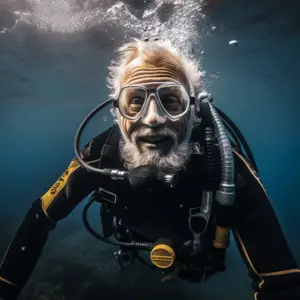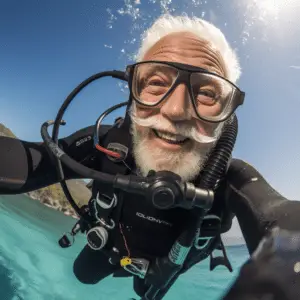The simple answer to the question of whether or not there is a maximum age for scuba diving is no. There is no maximum age for scuba diving. In fact, many sources encourage those who are a little older to do everything they can to get some exercise. If you are a more senior diver, then there are some things to consider especially if you are not very experienced, including making sure you know your limit and that you don’t push your body to the point where you may be in danger. Scuba diving is not off-limits for an older participant by any means. It just requires you to take extra care of your safety and those around you. This extra awareness of how long you can spend in the water before feeling tired is essential in making sure you are as safe as you can be and so that you can focus on having fun with your diving.
Risks of Scuba Diving When You Are Older

Like any form of exercise, there are some risks if you are older. Rather than trying to compete with many younger sports participants’ high energy athletic performances, you should focus on working out how much your body can take. It is important that you see the difference between a good workout and putting your body through strain that could cause damage or increase the risk of injury.
Energy consumption
Scuba diving has many risks for even the healthiest of divers, so it is vital that you take extra care as an older diver. One of the most significant risks would have to be that you can quickly run out of energy and find yourself in trouble in the water. Any water sport carries this risk, but for an older body, it will increase slightly compared to those at full health. Any sport that requires you to spend time in water carries this risk due to the high amount of energy that is required to maneuver your body through water, as well as being without natural oxygen and having to force yourself to go underwater. There is a significant risk of becoming tired from scuba diving.
Risks caused by sealife
Scuba divers also risk damage from wildlife interactions. Many skilled divers spend time underwater to observe animals. Divers should avoid getting too close to coral, plants, and rocks because older bodies are more prone to harm. Your lung capacity and ability to hold long breaths decrease with age. Scuba divers should breathe consistently and hold their breath for long periods. Before diving, you should be informed of the risks because your breathing capacity will decrease with age.
Rules and Regulations
There are no rules prohibiting divers beyond a certain age. This is good since older people shouldn’t be discouraged from doing healthy things. Keeping active is important for health, thus older people having access to sports and leisure activities is great.
However, diving destinations may have safety restrictions and regulations. Many diving companies recommend that beginners and those with less experience and fitness speak to a professional before diving to ensure they know the proper driving safety procedures. This is especially important for beginners, so don’t be afraid to ask. You, the professionals, and your diving group will know what to do in an emergency, which gives you peace of mind.
Other than obeying your diving coach or company’s directions, the only regulations are dive site restrictions. As long as you follow the diving guidelines, you should have fun regardless of your age. As long as you are sensible, you may start looking at the finest places to dive in Europe and arranging your next vacation at any age.
How to Stay Safe as an Older Diver

You may be deterred from diving at an older age after hearing all this about the risks. However, it is not the mindset, and you should be ready to execute any fitness workout at any age for your physical and mental wellness. Older divers can take several safety precautions. Due to the lack of legislation governing a maximum diver age, you must take the required safeguards, as you may need more than a younger diver.
Your diving gear must be top-notch. As an older diver, you’re more susceptible to pressure and water temperature, so sourcing high-quality protective gear is crucial. A heavy wetsuit helps regulate body temperature. Entering the chilly water could cause shock or loss of breath. Any high-quality wetsuit made of thicker material than the typical design should reduce water effects. Also applies to diving mask. Buying a mask that fits your face is crucial. Limiting distractions is crucial for older divers’ safety.
Diving at an older age is risky since you should never fly afterward. Diving communities often ask if you may go to altitude after diving. Answer: Never board a plane after scuba diving, regardless of age. Older people are more likely to get really sick, thus they should avoid it at all means to protect themselves. With sufficient knowledge into the risks and how to make the experience safer, mature divers should not be afraid to try this fantastic leisure activity.
